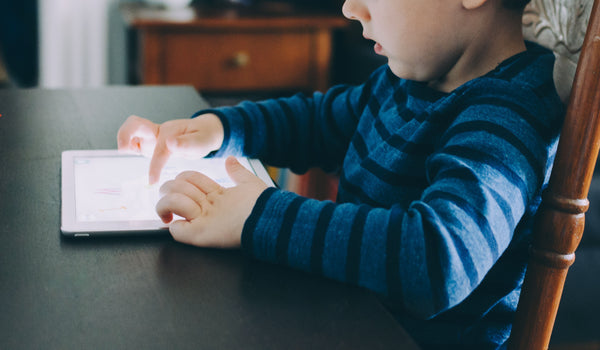Children’s Life Stress: Emotions And Coping

We may not realize it, but there are many life events children experience which can be considered stressful to them. In this blog, we’ll take a look at types of life stress, the emotions these produce, and ways to help your child cope.
When I learned I was expecting our second child, my overjoyed mother asked our son how he felt about a new baby arriving. He very seriously and sincerely responded to his grandmother, “I’d rather have a cat.” While this became part of our family stories, and consistently got laughs, the truth is that in his own way as a child, he was conveying that he was experiencing the life event of a new sibling to be stressful.
Types of Life Stress
First, let’s briefly define some terms. Life events are discrete experiences that disrupt one’s typical activities, triggering a considerable change and readjustment. Stress is experienced when one does not have the physical, emotional, or cognitive resources needed to cope effectively with the change.
Researchers have been studying life stress in children for decades and we now know those events which most children experience; and those that occur, but less commonly1.
|
More Common |
Less Common |
|
New sibling |
Parent away on business |
|
Starting school |
Relative or friend moving in |
|
Moving |
Parent losing job |
|
Best friend moving |
Older sibling leaving home |
|
Parent starting new job |
Parent remarrying |
|
Death of a non-parent relative |
Parent having an accident |
|
Hospitalization of child |
Parent or sibling with serious illness |
|
Divorce |
Death of parent |
Impacts of Negative Life Stress
In general, negative life events have been associated with many consequences for children, including an increase in behavior problems, a decline in physical health, poorer psychological functioning and mental health, and an overall decrease in adjustment at both school and home1,2.
However, not all life events are “equal” because the type of and degree of consequences are dependent on the nature of the event, and by how the person experiencing the event feels about it. The meaning and interpretation of the same life event can be different for everyone experiencing it, so it is more about the subjective meaning rather than simply the objective occurrence. The example I shared in the opening illustrates this!
It is quite clear that there can be a discrepancy between the number of life events that children consider to be negative, compared to the number of negative life events their parents think they have experienced. It turns out that kids often report significantly more negative life events than their parents report for them2.
Emotions Triggered
When an event is perceived as negative by the child, this is very likely to trigger a number of emotions. These can include:
- anger
- fear
- frustration
- sadness
- shame
- jealousy
When the parent sees an event as positive, such as moving to a new house or starting a new job, they are often baffled when they see their child having issues. However, when a child views the event as negative and experiences negative emotions as a result, they often struggle in ways in which the adults in their lives cannot readily identify the cause. More frequent tantrums, a refusal to go to bed, regression in toileting, aggression, and so on, can take a parent by surprise.
The second point to consider is that children have fewer resources to cope with their negative life events, and this can lead to a spike in stress. It is obvious to most of us that younger children may not yet have the language skills to express their feelings.
But it goes beyond this. Younger children may not even have learned to identify and name the emotions they are experiencing. Past this, the ability to build and practice emotion regulation strategies may be lacking. Research indicates that a critical variable in adaptation is the ability to regulate the emotions being experienced during the change and readjustment period that accompanies a stressful life event3.
Strategies to Help Children Cope
- Teach your child about the different emotions, including what they are called and how they physically and mentally feel. The “How Are You Feeling?” and “Wheel of Choice” Posters are a perfect way to get you started.
- Be open to observing and listening to your child, and control the urge to want them to feel a different way.
- Be a guide for your child to learn to regulate their own personal negative emotions by teaching them steps to take to handle the feelings, such as:
- Acceptance-helping them know it is okay to feel negative emotions and that all people do.
- Positive refocusing-thinking about something pleasant instead of the event or doing an activity that makes them happy.
- Positive reappraisal-attaching a positive meaning to the event by looking for the silver lining.
Check out the My Moods, My Choices® Flipbook, which is full of great ways for kids to make positive choices when feeling negative emotions.
Closing Thoughts
As parents, it is always hard to see our little ones experiencing negative life events and the accompanying stress. But as humans who think and feel deeply, it is inevitable that we will experience such times, even as children. Helping your children learn to cope is a gift that will serve them well throughout their entire lives.
References
1Furniss, T., Beyer, T., & Müller, J. M. (2009). Impact of life events on child mental health before school entry at age six. European Child & Adolescent Psychiatry, 18(12), 717-724.
2Johnston, C. A., Steele, R. G., Herrera, E. A., & Phipps, S. (2003). Parent and child reporting of negative life events: Discrepancy and agreement across pediatric samples. Journal of Pediatric Psychology, 28(8), 579-588.
3Hu, T., Zhang, D., Wang, J., Mistry, R., Ran, G., & Wang, X. (2014). Relation between emotion regulation and mental health: A meta-analysis review. Psychological Reports, 114(2), 341-362.
Written by Lilla Dale McManis, MEd, Phd
Dr. McManis is a psychologist and certified parent coach. Drawing on her 30+ years of experience, her work focuses on promoting optimal outcomes for families. Her main mission is to do so by translating research into meaningful practice for parents, educators, programs and products, and policymakers.
Also in Blogs

Does Your Child Live in a High-Conflict Environment?

“What's On?” The Impact Of Media On Kid's Emotional Well-being

